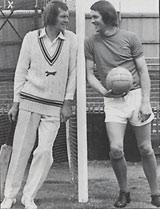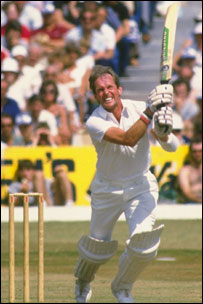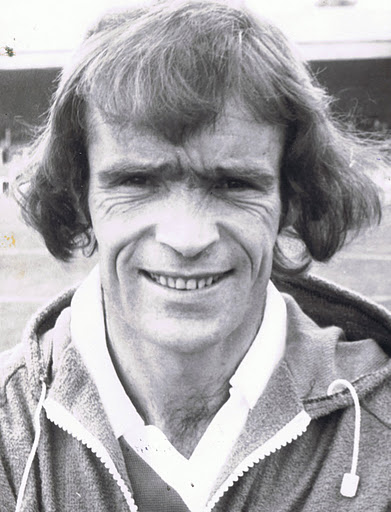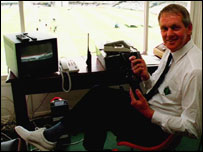One player who never had any problems filling his Summers was Chris Balderstone. He was born on 16th November 1940 in Huddersfield. As a footballer he has been described as all of quick thinking, skilful, cultured, a thinking man’s footballer and as being a two footed passer with great balance. He was also a professional cricketer and umpire, making it to international cricket in both disciplines.

Balderstone`s football career started with Huddersfield Town where he was signed by Bill Shankly in May 1958. “I`ll make you the best wing half in the country, son”, Shankly told Balderstone with his trademark up-tempo manner.
Balderstone had to wait until Denis Law’s departure to Manchester City created a first team vacancy. With a first team debut on 5th March 1960, Balderstone scored in a 2-1 defeat away to Cardiff City. All Balderstone`s time at Huddersfield was spent in the second tier of English football. That though changed in June 1965.
“Huddersfield appointed a new manager who didn`t really fancy me. I`d played about 140 games for them and never thought about leaving, but if they don`t want you any more you`ve got to move on to where somebody does.”
He moved for £7,000 to Carlisle United who had just been promoted to the second tier of English football for the first time in their history. As Balderstone later said, “They gave me a bit of stick at first because I wasn`t the quickest player or the hardest tackler. I used to think I made up for it with speed of thought and control of the ball. I always had confidence in my ability and I knew there`d be somebody in the crowd who appreciated a bit of skill. I won them over and they were very good to me after that.”

Again scoring on his debut, the second minute opener in a 4-1 home win over Norwich City, this gave him the distinction of the club`s first ever goal in the second flight of English football. He stayed with Carlisle for the next decade, the club`s most successful period. Not only was he a key player, he also became club captain. The best known of his team mates from there are probably Stan Bowles and Bob Hatton.
His most notable cup run was in the 1969/70 League Cup where Carlisle made it to the semi final. He enjoyed other successes in cup competitions, “In 1970 we beat [holders] Manchester City in the League Cup when they had Lee, Bell and Summerbee. And in `74 we beat Sunderland at Roker Park in the FA Cup when they were the Cup holders. We played against Liverpool in the next round and took them to a replay.”
Balderstone first appeared in first-class cricket on 10 June 1961 against Glamorgan for the strong Yorkshire side of the decade. It was from 1963 when he started to play regularly but only during the football close-season as a slow left arm spin bowler and a lower-order batsman. Balderstone was also an exceptional fielder. His football career, however, took priority and he did not play in more than 11 matches in any season as Yorkshire were County Champions five times between 1962 and 1968.
He left Yorkshire in 1971, later commenting, “Ray Illingworth took me to Leicestershire. I might be a decent bloke on the outside but he knew I was mentally hard through football. Cricketers might think they`re pretty hard but they`re not compared to footballers. It was a great move for me.”
Leicestershire won their first-ever trophy, the first ever Benson and Hedges Cup, at Lord`s in 1972. In a final where other batsmen struggled, Balderstone took the man of the match Gold Award with the day`s top score. Going to the crease at 58 for 3 and the match in the balance, Balderstone`s 41 not out steadied the ship and saw his side safely home against, with some irony, his ex club Yorkshire. This marked the beginning of Leicestershire`s first ever golden era with 5 trophies in 5 seasons, all with Balderstone at the core of the side.
An indication of his changing priorities materialised in 1973. He jumped to the forefront of English batsmen, making 1,222 runs at an average of 42. Establishing himself among the most consistent batsmen in England and being whispered as a possible international selection, Balderstone elected to finish the cricket season for the first time. Rather than join Carlisle for pre-season, Balderstone had the Brunton Park captaincy taken from him as he knew his decision would. There was also another repercussion that involved someone else destined to play for Queen of the South, Bobby Parker.
In 1973-74 Balderstone enjoyed promotion to the First Division, then the highest level in the English football pyramid. “I knew then I wouldn`t miss any pre-season training because I was desperate to play in the First Division.” He added, “Every year till then I`d been a 42 games a season man, barring injury. It was a rubber stamp job. But the season before Alan Ashman had to think about replacing me when I missed training and he brought Bobby Parker into my position, which by then was sweeper. I was getting a bit old for midfield and was quite happy at the back. But I was moved back into midfield and found it hard work and missed a few games.”
The third game of the top division campaign gave Balderstone the most famous goal in Carlisle United history. “I was very, very nervous as I placed the ball on the spot, especially with Pat Jennings between the posts. Jennings saved it but he must have moved, so the referee ordered me to take the kick again. I was very pleased and relieved when my second attempt hit the back of the net.” This 1-0 win against Spurs put Carlisle on to the top spot of the English football pyramid. Despite wins over the likes of Chelsea, Arsenal, Man City, Everton (twice) and eventual League Champions Derby, Carlisle were relegated at the end of the season. This was Balderstone’s last at Brunton Park and the only relegation in his career. He played 376 Carlisle league games scoring 68 goals. “I was in midfield for most of my career, although I played every position except goalkeeper for Carlisle.”
In 1974 he top scored for Leicestershire in the Benson and Hedges final again but this wasn`t enough to save them from defeat against Surrey. Silverware was picked up though as winners of the 40 over Sunday league competition to better the runners up spot of two years before.
Balderstone was a consistent run-getter, passing the 1,000-run mark in 10 of 12 straight seasons, batting either in the middle order or as an opening batsman. His runs were an important part of Leicestershire`s first County Championship success in 1975, and he also weighed in with 43 useful wickets that season.
Balderstone joined Doncaster Rovers at the end of his season in the top division to play a season for Donny. It was when he was with Doncaster that the moment came when he unwittingly wrote himself into a thousand pub quizzes.
In the game where Leicestershire won their first ever County Championship, on September 15 1975 at Chesterfield, Balderstone was on 51 not out against Derbyshire. After close of play he changed into his football gear to play for Donny in an evening game, a 1-1 draw at home against Brentford. Thus he is the only player to have played League Football and first-class cricket on the same day. As if that wasn’t enough, he then returned to Chesterfield to complete his century the morning after and took three wickets in clinching the championship title. To add to that season`s cricket success another Benson & Hedges trophy was bagged.

With cricket now winning his battle of conflict with football, his international debut finally arrived in 1976 when aged 35. He however had the misfortune of debuting against a West Indies side who were terrifyingly establishing themselves as the blasting blistering best, a level they were to maintain for over a decade. Balderstone and his England team mates weren’t helped by Captain Tony Greig’s outstanding entry for the title of ‘idiot du jour’. Greig, an apartheid era white South African allowed to play for England through his parentage, told the press of the West Indians at the start of the series, ‘I intend to make them grovel’.
Balderstone: “I`d done well for Leicestershire, scoring around 1,000 runs and averaging 40-ish. The England call-up probably came a bit late for me and the West Indies were hard opposition but you can`t pick and choose when you get selected. I played in two Tests. The first was at Headingley, where I`d made my debut for Yorkshire in 1961. I got 35 in about three and a half hours and I had a few bruises; Michael Holding and Andy Roberts were a bit sharp. It`s tough at the top. The second Test was at the Oval and I scored a pair.”
At a parched Oval, he encountered Michael Holding. ‘Whispering death’ delivered one of the finest individual fast-bowling performances in history. Holding took 14 wickets in the test on a docile pitch. Opposing fast bowler Vanburn Holder later said of Balderstone, “I played against him when we had a pretty ferocious attack and he never blinked. He had plenty of courage.”
Despite being an outstanding fielder, Balderstone lamented dropping Viv Richards, then on 151, at The Oval off Derek Underwood’s bowling. “I don`t think ‘Deadly’ [Underwood] ever forgave me.” Richards matched Holding with a career best performance in that test – he went on to score 291. Balderstone had the minor consolation of a remarkable catch off Roy Fredericks’ batting in the same contest.

(Chris Balderstone in his Queen of the South days)
Balderstone`s next football club was in Scotland. “Queen of the South rang me up. Carlisle used to play practice matches against them and they remembered me. I caught the train to Dumfries from Leicester every Friday night. It was quite a trek but it gave me another couple of years football.”
Signed by Mike Jackson, Balderstone’s QoS debut was in 1976 after the cricket season’s end, a 1-1 draw with St Mirren on October 16th. Balderstone was on the bench. He went on to make 39 QoS first team starts and three subs appearances. His last Queens game was just before the start of the 1978 cricket season - a 3-0 defeat away at Dundee on March 11th. Possibly the most famous game in his two seasons at Palmerston was the 6-0 League Cup thumping of Dundee with Gordon Strachan in his last performance for the Dee before his move to Aberdeen. However Balderstone was on the bench. In his second season with the Doonhamers, Balderstone was re-united with another seasoned campaigner from his stint in England`s top flight with Carlisle, midfielder Les O`Neill.

(Les O`Neill in his Palmerston days)
The words of a couple of Balderstone’s Palmerston team mates:-
Crawford Boyd: “I was very fortunate to play with a guy called Chris Balderstone, whose legs were done, but I’ve never seen anybody pass the ball so well. I had a broken leg the year that he was there, I watched him. He had a guy in the middle of the park beside him, Benny Ferrie, who wasn’t the best of players but Benny could run, Benny could move, he was the legs for this Chris Balderstone. Chris Balderstone was superb.”
George Cloy: “The best passer of a ball I’ve seen at Palmerston was Chris Balderstone when he was there. He was absolutely different class. Different class, you could see he’d played at a higher level than most of us who were there.”
After Queens, Balderstone played for non-league Enderby Town in Leicestershire.
1977 was the last trophy of Leicestershire`s first great period with a second Sunday League victory. In 1981 against Essex at Grace Road, Leicestershire`s home ground, Balderstone shared an unbroken county record second wicket stand of 289 with David Gower. He scored 19,034 first class career runs chalking up 32 centuries with a personal best of 181 not out against Gloucestershire in 1984. His 17,627 run tally for Leicestershire is 11th highest in their history.
Test team mate Mike Selvey said, “He bowled left-arm spin at a pace so deceptively slow that it is surprising there was energy left on the ball ever to dislodge a bail.” Despite the humour in Selvey’s comment, Balderstone collected a not to be sniffed at 310 first class wickets with his best bowling figures of 6 for 25 against Hants in 1978. He also bowled a hat trick against Sussex in 1976. The high profile test match drop of Richards belies the truth behind his fielding – he held 210 first class catches.

After having treated football as his first priority in his younger years, Balderstone played on for Leicestershire into his mid-40s without noticeably losing form with the bat nor in the field. Although his bowling regularity decreased from 1980, his batting helped take Leicestershire to runners up in the 1982 County Championship. He picked up a sixth and final winners` medal with a third Benson & Hedges victory in 1985. This makes him winner of the highest number of medals in Leicestershire`s history. Balderstone was given a testimonial benefit season in 1984 along with ken Higgs and played on for Leicestershire until 1986. On giving up playing, he stayed in cricket.
“It`s nice to still be part of the game and it`s another career to try and reach the top in. I went straight from playing one year to umpiring the next. All umpires are ex-players and soccer could learn from that. You`ve still got to give the right decision but the fact that players know you`ve done the business helps. Third and Fourth Division football players aren`t earning fortunes and if they knew refereeing would be a worthwhile career they could learn while playing.”

Balderstone joined the first class umpires list in 1988, standing in two one-day internationals in the 1990s, both against South Africa. He has the small distinction when, at Lord`s in 1993, he gave Robin Smith out to make Smith the first player given out by TV replay in an English Test.
Any opportunities to officiate again at international level were denied by illness. Chris Balderstone died at his home in Carlisle on 6th March 2000, having suffered from prostate cancer.
Barrie Leadbeater, the umpires` chairman as well as a close friend, said: “He was a fine, positive player who won a lot of friends by his approach. He was a gentleman in everything he did on and off the field and his death came as a tremendous shock. He will be sadly missed. There was a refreshing honesty about everything he did and he was a true sportsman of the like we don`t see today.”
Former foe Vanburn Holder also became an umpire and stood in Balderstone`s last game as an umpire at Canterbury. Holder said: “He was a great companion, a fine umpire and an exceptional sportsman.”
Barry Dudleston, a former Leicestershire team mate and another umpire said, “He only ever saw good in the game, both football and cricket.”
Many thanks for the contribution to this feature of ex QoS Programme Editor, Bruce Wright.